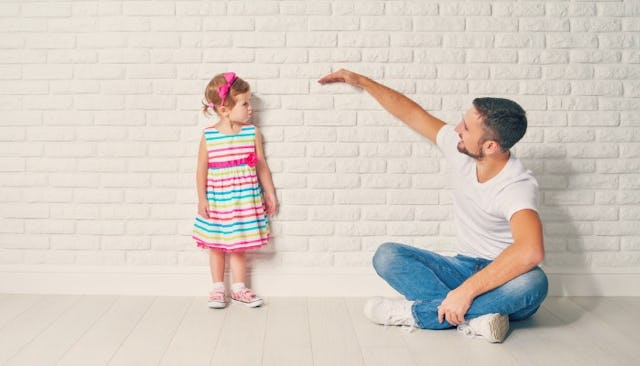When Your Child Doesn't Look Their Age

Last month, I took my daughter to our local driving school to sign up for driver’s ed. The director took one look at my 15-year-old and chuckled. “You don’t look old enough to drive,” he said. “My 12-year-old niece looks older than you!” He attempted to say it lightheartedly, as if we were all in on the same joke, but as anyone with a shred of awareness knows, unsolicited comments about looking three years younger than your age isn’t a welcome conversation starter for a teenage girl. She was not amused.
My daughter began looking younger than her age when she was about 6. As her peers grew taller, she stayed petite. Her same-aged girlfriends started filling out a full two or three years before she did, and she’s not been thrilled with those differences. “When am I going to grow, Mom?” she often asks, equal parts annoyed and angry at the unfairness of it all. I try to convince her that she’s built just the way she was meant to be, and that she’ll grow if and when the time is right — which, of course, only ticks her off further. I try to tell her there are benefits to being short, but she doesn’t want to hear it. She wants to be tall, to at least look her age, to not have people always pointing out how young she appears.
But there actually are some advantages of having kids who are small for their age. For one, they usually come across as smarter, more skilled, and more mature than their peers. For example, my daughter played violin beautifully when she was 11, but the fact that she looked like she was 8 made it even more impressive. We have a friend whose tiny 4-year-old still wears size 2T pants, so when he opens his mouth and a full, intelligent thought falls out, you can see the shock on people’s faces as they think, “Wow, what an articulate toddler!”
I’ve also had friends with kids on the other end of the spectrum. The kids who look a lot older than their age face a whole host of challenges, from constantly outgrowing clothing to unrealistic expectations. People expect much more maturity out of physically bigger kids, so the judgmental looks come swift and hard toward parents who are gifted with early-blooming children.
My friend’s daughter has been exceptionally tall since birth. At age 3, she had extra long legs and virtually no baby pudge to speak of, so she looked more like she was 5 or 6. We all know how a 3-year-old can pitch a fit over the wrong-colored cup, right? That delightful behavior looks a lot worse on a kid whose appearance suggests they should be way past that stage.
I have another friend whose son is 6 and is the same height as his mother — and she’s not short. He isn’t just a little tall for his age; he’s ginormous. He wears clothes most 12-year-old boys can wear, so you can imagine what people think when he behaves like a typical first-grader. He’s a little kid trapped in a big-kid body, but strangers don’t know that. All they see is a big kid whose parents clearly haven’t civilized him properly.
Or how about the girls who develop early? I knew someone whose 10-year-old wore a C-cup bra and looked like a teenager in a swimsuit. Talk about unreasonable — not to mention inappropriate — expectations from the public.
I know that this is something parents of developmentally delayed kids also have to deal with — along with a whole host of other issues — so it’s given me a newfound sense of empathy. While having your child’s age miscalculated is hardly a huge life challenge in the grand scheme of things, it can be tricky.
We live in a world where people tend to be critical of kids’ behaviors anyway, and having a child whose insides don’t match their outsides naturally leads to assumptions and expectations that are either inaccurate or unfair. Not to mention, it gets old to constantly have your kid’s physical size be the first topic of conversation, or to repeatedly say things like, “Yes, I know, she’s really small for her age,” or “No, he’s not reading because he’s 3. He only looks 7.”
It’s good for all of us to remember that kids may not be what they appear at first sight, especially when we are tempted to judge. When a mom brings a boy who must surely be 9 or 10 into the women’s bathroom with her, he may only be 5. When you think, “Why is that kid still using a pacifier?” that kid may not be as old as they look.
I actually had to remind myself of this when I dropped my daughter off for her first class at the driving school. You have to be 15 to take the class, but I watched a kid who looked like he couldn’t possibly be older than 11 — no exaggeration — walk in and sit down in front of my daughter. She and I exchanged a quick, wide-eyed glance, and I’m sure a look of pity crossed my face for the poor boy.
My daughter just looked at him and smiled.
This article was originally published on